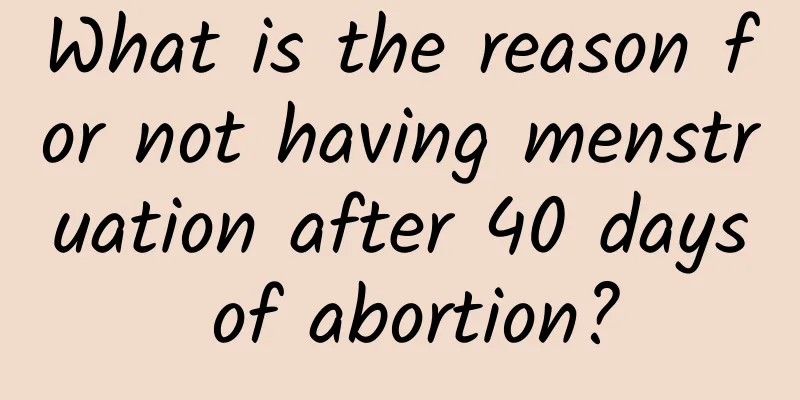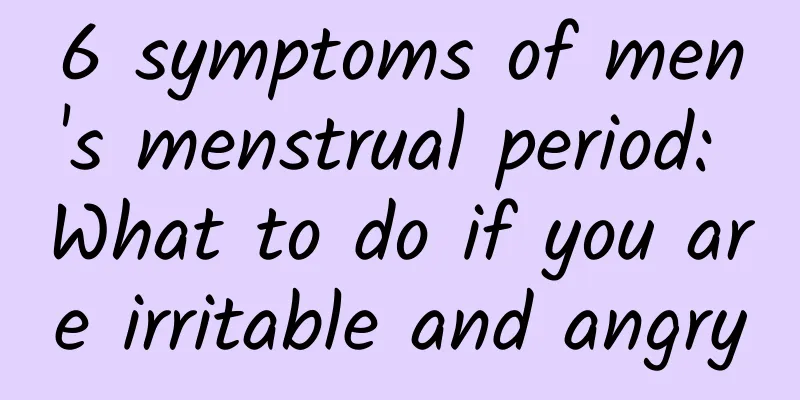What is the reason for not having menstruation after 40 days of abortion?

|
Women's bodies are very weak after an abortion, but many people don't know much about this. Many times, women's menstruation is abnormal after an abortion. Some even haven't had their menstruation for 40 days. So what is the reason for not having menstruation for 40 days after an abortion? Let's see how authoritative experts answer this question based on years of clinical experience. 1. Situation after abortion: 1. After the abortion, the hormones in the body quickly withdraw, leading to endocrine disorders, thus affecting menstruation. This is a very common situation. Generally speaking, after painless abortion, the ovaries can resume ovulation function within 22 days, and menstruation will come in about 1 month. However, a small number of women experience menstrual disorders such as prolonged menstruation, irregular cycles, and amenorrhea after painless abortion. This situation generally returns to normal after 2-3 months, and a few people last longer, which requires regular review. It is worth noting that if you have not had your period for more than 50 days, you should go to the hospital for examination in time. In addition, if you have fever, pain, excessive leucorrhea with a strange smell after painless abortion, you should go to a professional gynecological hospital for examination and treatment immediately. 2. The menstrual period after abortion also varies according to the individual's pregnancy days and individual physical constitution. Since painless abortion causes changes in the body's hormones, it may also cause ovulation to be delayed, and at the same time, menstruation will be delayed. Therefore, there will be a phenomenon of not having menstruation for one or several months after painless abortion. If menstruation is delayed for more than 7-10 days, you must go to the hospital for a detailed examination. 3. The time of menstruation after abortion varies according to the number of days of pregnancy. After abortion, the ovaries can generally resume ovulation within 22 days, and menstruation will occur in about 1 month. It is also normal to have abnormal menstruation within three months after abortion, and the female menstrual cycle may be affected by some external factors. However, a small number of women experience menstrual disorders such as prolonged menstruation, different cycle lengths, and amenorrhea after abortion. This situation generally returns to normal after 2-3 months, and a few people last longer. 2. Causes of irregular menstruation after abortion: 1. Menstruation is determined by the hypothalamus-pituitary gland in the body. If various organic diseases are excluded, irregular menstruation after abortion is mainly caused by the physiological dysfunction of the endocrine reproductive axis of the hypothalamus-pituitary gland-ovary, which is medically called functional uterine bleeding. Generally speaking, functional uterine bleeding includes changes in the menstrual cycle and menstrual period, such as early menstruation, late menstruation, irregular menstruation, too long or too short menstrual period, amenorrhea, etc.; changes in menstrual volume include too much menstrual bleeding, too little menstrual bleeding, and endless menstrual bleeding. 2. Women's menstruation is the result of the interaction between the cerebral cortex, hypothalamus, pituitary gland, ovaries and uterus, and is regulated by neuroendocrine. When people are overly nervous, fearful, sad, overworked, or undergoing surgery, the neuroendocrine system can inhibit the functions of the hypothalamus, pituitary gland, ovaries and uterus, leading to menstrual abnormalities. 3. After an abortion, the placental chorionic gonadotropin disappears suddenly, making the ovaries unable to respond to the gonadotropin secreted by the anterior pituitary gland for a while, thus causing irregular menstruation. 4. During the abortion process, the basal layer of the endometrium is damaged too much, and the endometrium cannot regenerate, which causes the patient to suffer from long-term amenorrhea. The above is the introduction to "Why do I not have my period after 40 days of abortion?" I believe everyone has a satisfactory answer. In addition to understanding this knowledge, female friends who have had an abortion should develop good habits in diet and work and rest in life, avoid eating spicy, raw and cold food, and do more aerobic exercise that is beneficial to the body, so that the body is healthier and can live a happier life! |
<<: Treatment of neurogenic premature ejaculation
>>: Is secondary genital development possible?
Recommend
At what age do men's sexual functions end?
Sex has been a topic of discussion for mankind si...
How to exercise your penis to make it longer and bigger
With the improvement of people's living stand...
How to treat primary premature ejaculation?
Premature ejaculation in men can be said to be th...
What to do if a man is short? Experts will tell you the best answer!
There are many reasons why a person is short. It ...
What should I do if my hands feel itchy due to eczema?
Hand eczema is a common itchy skin disease. When ...
Is male sterilization harmful to the body?
Male sterilization is a relatively common long-te...
What are some ways to increase male sexual desire?
If there are problems in the sex life between hus...
How to effectively treat oligospermia?
In recent years, there have been many cases of ma...
How long does it take to heal after circumcision?
If a man has an excessively long foreskin, he mus...
What are the fast-acting aphrodisiac and kidney-tonifying drugs?
Aphrodisiac and kidney tonic is a topic that has ...
What causes prostatitis? Mostly due to these bad habits
Adult men should always be alert to prostate prob...
What is the normal length and width of the penis?
In the outpatient clinic of the men's hospita...
What is the reason for the red spot on the glans penis that does not hurt or itch?
We know that sex is the most common thing between...
Causes and treatments of hair loss in men
When many male friends approach the age of 40, th...
What are the symptoms of severe premature ejaculation?
Here are some symptoms of severe premature ejacul...









